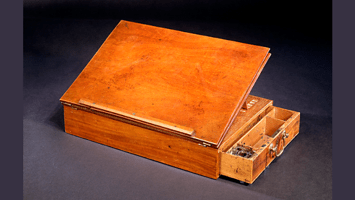Letter from Thomas Jefferson to Henry Lee about the Declaration of Independence
Jefferson explains that the Declaration of Independence sought to capture a particular strain of political thought that was important and prevalent in the time leading up to the American Revolution.

Thomas Jefferson’s desk; photo from the Smithsonian’s National Museum of American History. More information here.
Editor’s Note
Monticello May 8. 25.
Dear Sir
Your favor of Apr. 29 has been duly recieved, and the offer of mineralogical specimens from [M]r Myer has been communicated to Dr Emmet our Professor of Natural history. [T]he last donation of the legislature to the University was appropriated specifically to a library and apparatus of every kind. [B]ut we apply it first to the more important articles of a library, of an astronomical, physical, & chemical apparatus. [A]nd we think it safest to see what these will cost, before we venture on collections of mineral & other subjects. [T]he last we must proportion to what sum we shall have left only. [T]he Professor possesses already what he thinks will be sufficient for mineralogical and geological explanations to his school. I do not know how far he might be tempted to enlarge his possession by a catalogue of the articles and prices, if both should be satisfactory. [I]f [M]r Myer chuses to send such a catalogue, it shall be returned to you immediately, if the purchase be not approved.
That George Mason was author of the bill of rights, and of the constitution founded on it, the evidence of the day established fully in my mind. [O]f the paper you mention, purporting to be instructions to the Virginia delegation in Congress, I have no recollection. [I]f it were any thing more than a projét of some private hand, that is to say, had any such instructions been ever given by the Convention, they would appear in the Journals, which we possess entire. [B]ut with respect to our rights and the acts of the British government contravening those rights, there was but one opinion on this side of the water. [A]ll American whigs thought alike on these subjects. [W]hen forced therefore to resort to arms for redress, an appeal to the tribunal of the world was deemed proper for our justification. [T]his was the object of the Declaration of Independance. [N]ot to find out new principles, or new arguments, never before thought of, not merely to say things which had never been said before; but to place before mankind the common sense of the subject; […] terms so plain and firm, as to command their assent, and to justify ourselves in the independant stand we […] compelled to take. [N]either aiming at originality of principle or sentiment, nor yet copied from any particular and previous writing, it was intended to be an expression of the american mind, and to give to that expression the proper tone and spirit called for by the occasion. all it’s authority rests then on the harmonising sentiments of the day, whether expressed, in conversns in letters, printed essays or in the elementary books of public right, as Aristotle, Cicero, Locke, Sidney[,] Etc. [T]he historical documents which you mention as in your possession, ought all to be found, and I am persuaded you will find, to be corroborative of the facts and principles advanced in that Declaration. [B]e pleased to accept assurances of my great respect and esteem.
Th: Jefferson